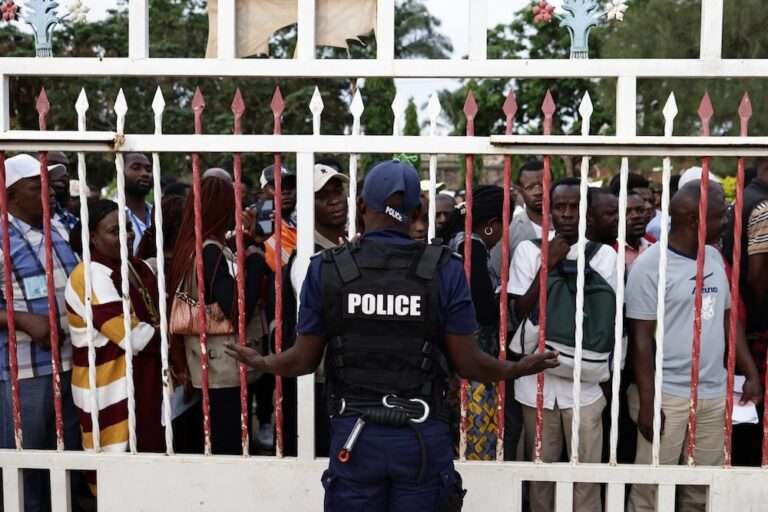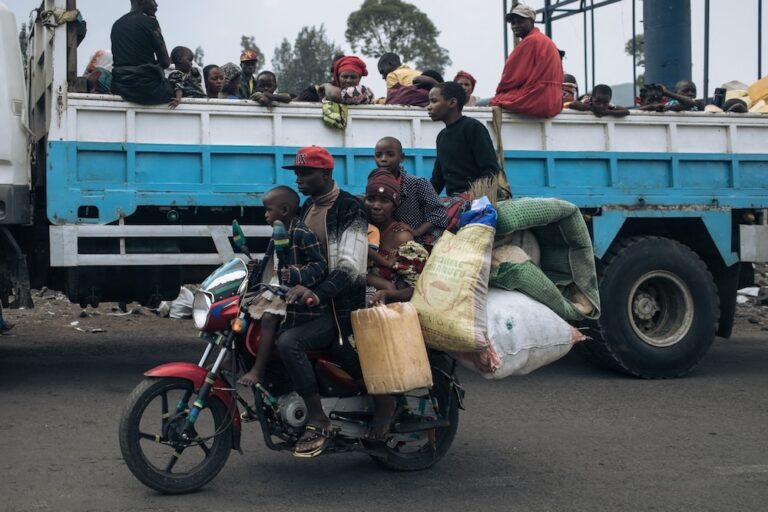(CPJ/IFEX) – In a 26 June 2000 letter to President Laurent-Désiré Kabila, CPJ expressed its outrage over the continued persecution of Freddy Loseke Lisumbu la Yayenga, editor of the Kinshasa-based weekly “La Libre Afrique”. CPJ condemned Loseke’s recent conviction for “insulting the army,” an absurd charge that is an affront to the most basic standards […]
(CPJ/IFEX) – In a 26 June 2000 letter to President Laurent-Désiré Kabila, CPJ expressed its outrage over the continued persecution of Freddy Loseke Lisumbu la Yayenga, editor of the
Kinshasa-based weekly “La Libre Afrique”. CPJ condemned Loseke’s recent conviction for “insulting the army,” an absurd charge that is an affront to the most basic standards of press freedom.
It is CPJ’s view, a view supported by a growing body of international law, that unlike individuals, governments and their component institutions can neither be libeled nor insulted. Democracy is weakened whenever public officials wield defamation statutes to stifle independent criticism of their public performance. And as it stated in letters to President Kabila on 31 March 2000 and again on 3 May, CPJ believes that no journalist should go to jail for what he or she writes.
On 31 December 1999, armed soldiers under the command of an officer known as Chief Iduma arrested Loseke at his Kinshasa residence. The journalist was then taken to the Kokolo military base, where he was flogged and confined in a dingy, windowless cell.
Loseke’s arrest resulted from two articles that he published in the 29 and 31 December issues of “La Libre Afrique”, which has since ceased publication. Both reports alleged an imminent army-sponsored plot to overthrow President Kabila. Sources in Kinshasa told CPJ that Loseke was initially charged with “betrayal of the state in times of war” – a crime punishable by death.
Loseke’s trial opened on 11 January at the Court of Military Order (COM) in Kinshasa. Despite the Democratic Republic of Congoâs (DRC’s) constitutional due process guarantees, he was denied legal representation. During the hearing, he was forced to reveal confidential sources. He identified General Hilaire Muland Kapend as the chief conspirator, outlined the coup plot, and named the plotters’ meeting spot. As a result of Loseke’s forced testimony, police arrested several suspects, including General Kapend (who was later released, according to international news reports).
On 14 April, a physically exhausted Loseke once again appeared before the COM, this time with legal representation. In their closing argument, Loseke’s lawyers pleaded for his temporary release from detention for health reasons (Loseke suffers from kidney failure, sources in Kinshasa reported). The presiding military judge quickly dismissed the motion, however.
Without any explanation, and over the objections of Loseke’s lawyers, the charge was later changed to “insulting the army.” Without further deliberation, the journalist was found guilty of this second charge on 19 May and sentenced to three years in prison. The decisions of the COM cannot be appealed.
CPJ is shocked at the injustice of this conviction and at the deplorable treatment of Loseke since his arrest on 31 December. His prolonged detention, and the murkiness of the legal proceedings against him, violate the DRC’s constitutional due process guarantees along with his internationally-recognized rights as a journalist. CPJ believes that Loseke did nothing other than seek, receive and circulate information, a right affirmed for all people, including journalists, by Article 19 of the
Universal Declaration of Human Rights.
Meanwhile, despite continued protests by CPJ, Congolese, and other press freedom organizations, the press freedom situation in the DRC has deteriorated even further. In all, more than seventy journalists have been imprisoned since President Kabila seized power in May 1997, according to CPJ’s research.
Recommended Action
Send appeals to the president:
– reminding His Excellency that he promised to respect press freedom when he addressed the United Nations General Assembly in New York in January
– urging him to publicly commit to respecting the rights of journalists to report the news without interference or fear of reprisal, and that he use the powers of his office to ensure that Loseke is immediately and unconditionally released from illegal detention
Appeals To
APPEALS TO:
His Excellency Laurent-Désiré Kabila
President of the Democratic Republic of Congo
Ngaliema, Kinshasa
Democratic Republic of Congo
Fax: +234 88 02120/ +202 234 2609
Please copy appeals to the source if possible.


